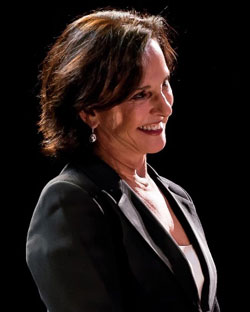Carmel Symphony Orchestra Artistic Director Janna Hymes has been invited to serve on a committee to review and nominate candidates for the Fulbright U.S. Student Program for study in the field of Music Composition/Conducting. The invitation came from the Institute of International Education, which administers the competition for the Fulbright program, sponsored by the United States Department of State in partnership with foreign governments and universities.

Janna Hymes
Established in 1946, the Fulbright U.S. Student Program offers recent graduates and graduate students opportunities for research, study, or teaching assistantships in more than 140 countries. Hymes will serve on the committee for a term of three years beginning this year. She will be participating in a process that involves reading and rating about 50 to 60 applications prior to a one-day virtual meeting with fellow committee members to recommend a limited number of candidates for further consideration.
“The Fulbright Program allows advanced students to spend a concentrated year of study achieving goals and improving skills while learning new cultures of a foreign country,” Hymes said. “My year as a Fulbright Scholar transformed my career and was one of the greatest experiences of my life. I am honored to be a reviewer for the 20-21 applicants in the field of music and look forward to working with colleagues from around the country.”
Hymes will begin the screening process for the Music Composition/Conducting committee in November. Her contribution to the Fulbright Program will play a crucial role in the binational selection of U.S. citizens looking to study, teach, or conduct research abroad. Fulbright actively seeks faculty from institutions across the U.S. in all academic disciplines. The contribution of the U.S. academic community to the Fulbright Program is a significant factor in the sustainability of the Program and is recognized each year in requesting funding from the U.S. Congress.
In 1945, Senator J. William Fulbright introduced a bill in the United States Congress that called for the use of surplus war property to fund the “promotion of international good will through the exchange of students in the fields of education, culture, and science.” On Aug. 1, 1946, President Harry S Truman signed the bill into law, and Congress created the Fulbright Program, the flagship international educational exchange program sponsored by the U.S. government.
From its inception, the Fulbright Program has fostered bilateral relationships in which citizens and governments of other countries work with the U.S. to set joint priorities and shape the program to meet shared needs. The world has been transformed in ensuing decades, but the fundamental principle of international partnership remains at the core of the Fulbright mission.
The Fulbright U.S. Student Program is the largest U.S. exchange program offering opportunities for students and young professionals to undertake international graduate study, advanced research, university teaching, and primary and secondary school teaching worldwide. The program currently awards approximately 2,000 grants annually in all fields of study and operates in more than 140 countries worldwide.
Fulbright U.S. Student alumni populate a range of professions and include ambassadors, members of Congress, judges, heads of corporations, university presidents, journalists, artists, professors and teachers. Bose Corporation founder Amar Bose, actor John Lithgow, composer Philip Glass, opera singer Renee Fleming and economist Joseph Stiglitz are among notable former grantees.
